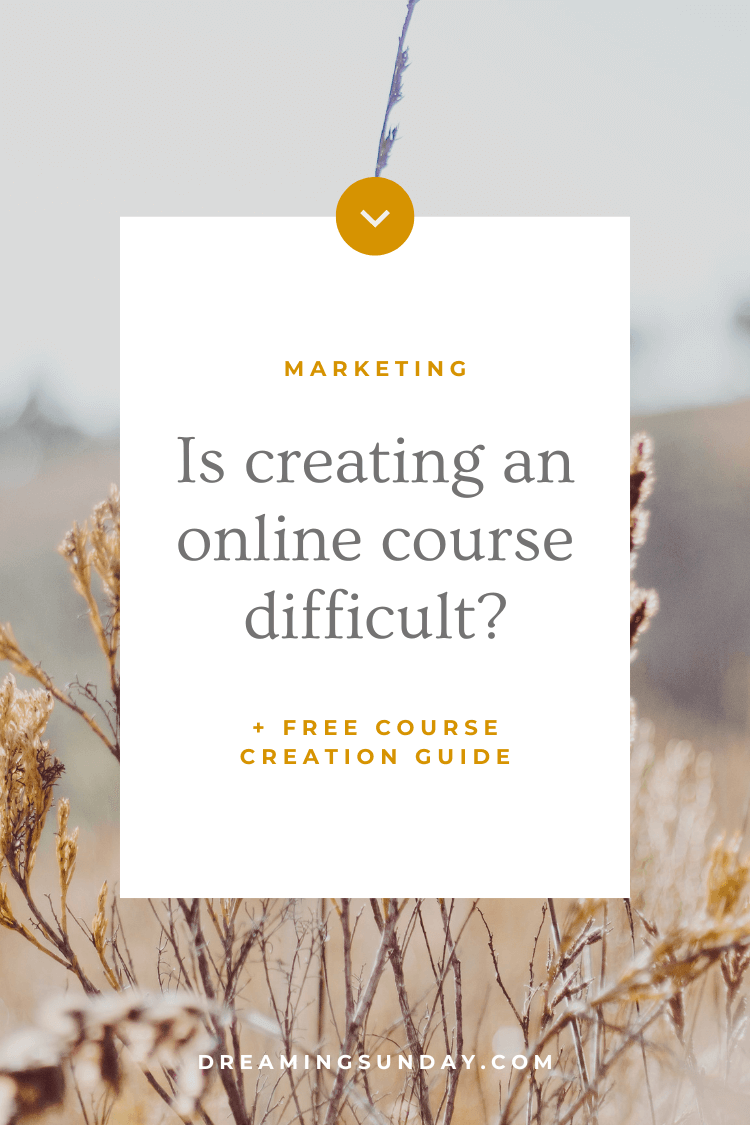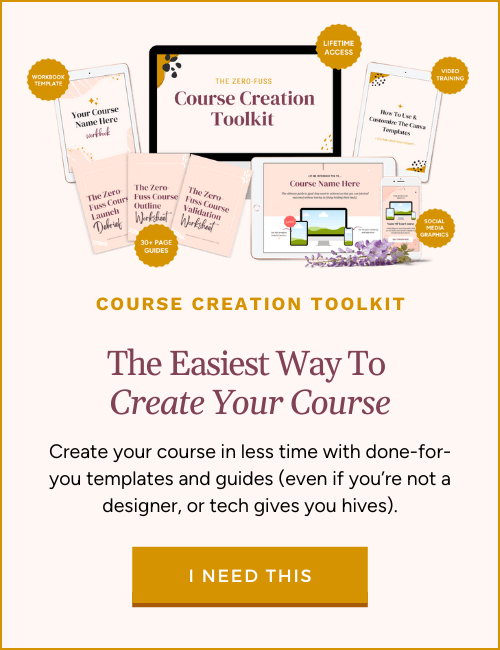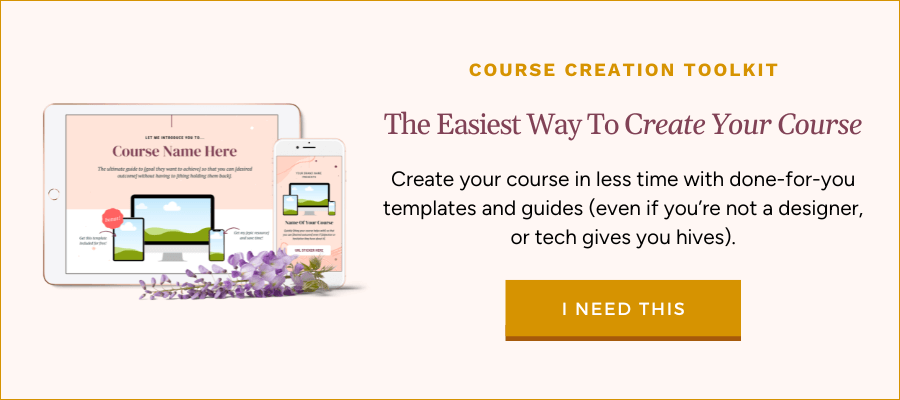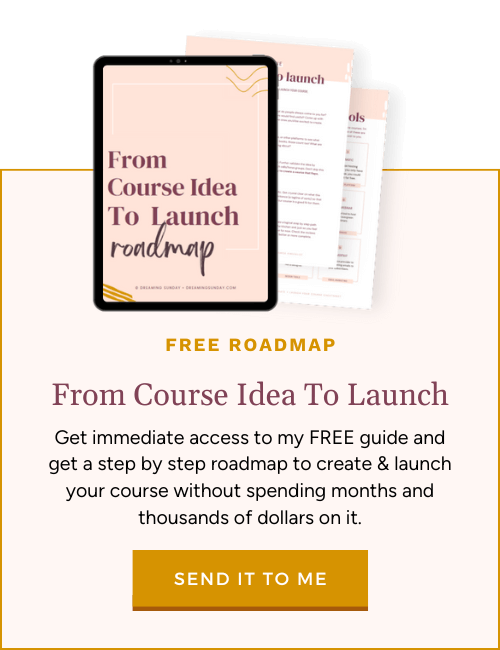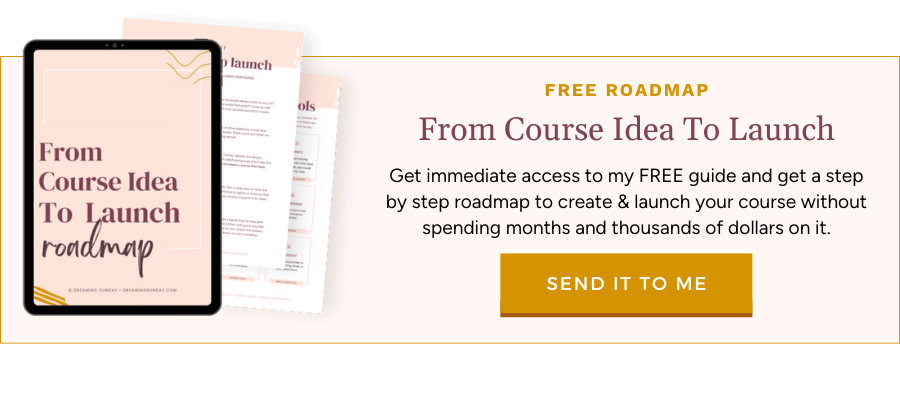Hey friend! If you’re thinking about creating a course and you’re wondering if it’s worth it or if it’s going to be so freaking hard you shouldn’t even bother, listen up.
Over the years I’ve created two courses, a few mini courses (screenshot below) and also did the bulk of the research and lesson content work on a course a past client of mine was working on. So I know a thing or two about what it takes to create a course.
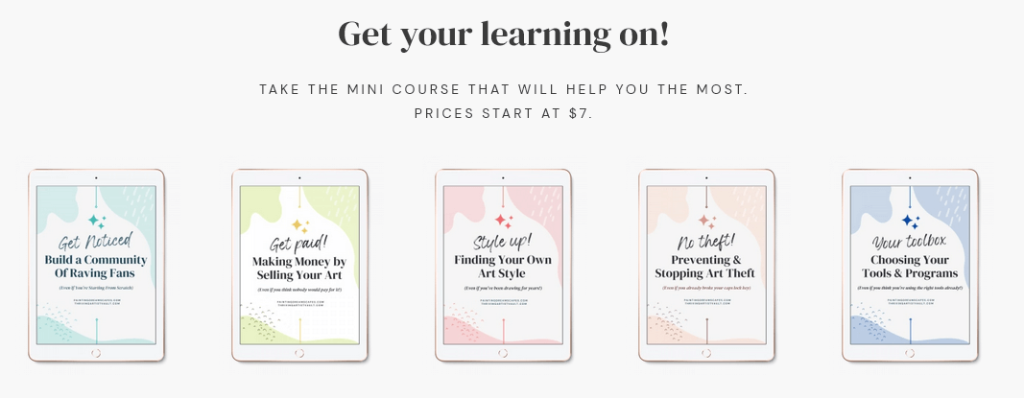
Preview of the courses I offered in my art business.
Is creating an online course difficult?
No, it’s not *difficult* per se. Not any more than doing anything else for the first time.
If you’re not very techy or you don’t have ANY teaching experience, you may find it challenging. Sure.
But what you may actually want to know is if creating a course is going to be a lot of work. Yes, most likely.
Creating a course without experience can be hard. But so is driving a car, or doing yoga (seriously, muscles I didn’t even know I had HURT like hell when I tried yoga for the first time!!).
If you’re willing to learn and you give yourself grace while you experiment with it, creating a course won’t be as difficult and you might even enjoy it.
(Also, how’s that for people complaining that creating a course on how to create a course is scammy? 
In fact, I wrote a post about how simple creating a course can be and the only 3 tools you need to do it. Boom.

What goes into creating a course?
Here’s a bird’s eye view of the steps I take when I create a course, and that you may want to follow if you decide to create your own course too.
1. Decide what specific topic I want to create a course on (what are YOU good at?)
2. Do market research online (Google, Youtube, Facebook groups…) to find what *specific* problem I can solve for people.
3. Determine what’s the transformation my course can provide for people (what’s the before and after? What will people achieve?) and what to charge for it. If you’re not very well known, I recommend starting with a smaller price tag and increase it as you get more students.
4. Hop on market research calls with my ideal audience or future students if I need first-hand knowledge of what they need from the course. Or host a focus group (market research with more people).
5. Review reviews (pretty meta, huh?) on Amazon books, Udemy courses, blogs or other review aggregator platforms to see what people loved about the courses on that topic, what they felt was missing, etc.
6. Start outlining the course content. What modules do I want to include? What lessons go into each module? How do I organize the content in a chronological, step by step way so it’s easy to follow?
7. Time to get on Canva! I use my Course Creation Toolkit slide presentation template to start adding my talking points to the slides of each lesson. Also examples and common obstacles they might find as they take action.
8. Once the slides are ready, it’s time for me to record. I use Loom to record and my Blue Yeti mic (you don’t even need to be on camera). I might do a 2-min dance before recording to shake the nerves!
9. After recording, I edit the videos in Loom (or Filmora, depending on the complexity of edits needed) and export them into video files (mp4). Name the files properly so you know what file is what!
10. Hooray! Course is almost ready freddy. I now just need to upload the files to my course hosting platform. I use Thrivecart Learn (affiliate) but you can check my other recommendations here. I use Loom to host my videos but you can also use Vimeo (or use a course hosting platform that hosts videos for you).
11. Lastly, I create a checkout page so people can enroll in my course. You’ll want to make sure your checkout is integrated with your course platform so people get instant access when making their payment.
Whew! Creating a course CAN take a lot of time, that’s for sure. That’s why you might want to start with a smaller course first. You’ll be able to create a big course down the line when you have more experience.
You might find it hard to create an online course if...
✦ You don't have any skill or knowledge that others want to learn about.
You don’t have to be the absolute expert on a topic to create a course, but you need to be well versed enough and have personal experience with it.
If you need to rely on ChatGPT to create the content for you, you probably shouldn’t be creating a course, friend. The best courses come from the things you know and are good at. Passing along the knowledge and skills you’ve gained in your life, not what some robot has scraped off the internet 🙂
Now, you may think you’re not good at ANYTHING. And I think you 100% are but you’re not giving yourself enough credit. What are others always coming to you for help with? That’s a starting point for you right there.
✦ You're allergic to tech and don't want to bother with the learning curve
Online courses are, well, online. And that means that you’re going to have to learn the ins and outs of the online world. How to use tools such as canva, loom, video editors, course platforms, checkout systems, integrations between tools, email lists, funnels, etc.
Good news is that there’s PLENTY of free info online about all of those things. Bad news is, if you’re not willing to learn and experiment, the frustration will get the best of you.

✦ You lack confidence in yourself and your skills.
Trust me, this is what held me back from going all in with my first course. Your limiting beliefs are going to tell you that you’re not good enough and nobody’s going to buy.
I spent 15 years being an artist and illustrator and selling art commissions for $200-$300 and STILL I felt I wasn’t good enough to teach other artists. Even creating FREE tutorials felt so painful.
If you’ve ever made a course and it didn’t sell at all, look back and see if fear and mindset blocks kept you from really showing up and promoting it properly.
✦ You don't care much about teaching or helping others but you want to make money from the online course boom...
Creating a course is a LOT of work, and also very confronting (mindset blocks galore). If you’re in it for the money, chances are you’ll quit before you get very far.
Heck, you might even make it through creating a course but what then? Selling your course requires even as much work or more as creating it. You need to find your community, nurture them so they trust you, and then sell the course.
If you’re in it for the money, you likely won’t have the patience to stick through the whole process and sell enough copies to make it a sustainable business (that you probably will hate anyway). People will also perceive it if you’re in it just to make a quick buck (it won’t be quick tho).

Over to you - Do you think creating a course is worth the effort?
Creating a course can be difficult if you’re not techy, and challenging if you’re new to it. But it can also be extremely rewarding if you’re doing it to help people. And it can be highly profitable if you do things right.
With this in mind, do you feel like creating a course is right for you? Are you going to try your hand at it? Let me know in the comments below!
And if you’re ready to create a course, I want to share two of my best resources for that (both under $100!):
✦ My course Aligned + Confident will help you release the most common limiting beliefs you’ll face as you create your course and help you feel confident instead.
✦ My Course Creation Toolkit is a bundle of all assets and templates you’ll need to create your course, already designed for you. It’ll save you so much time and so many headaches.
I hope this post helped you! If you need anything, I’m one email away, or you can join me in my Facebook group 🙂

